Related Research Articles
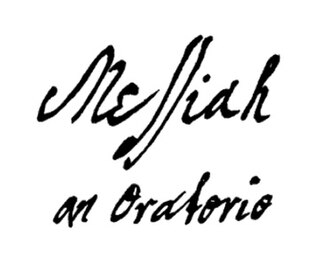
Messiah is an English-language oratorio composed in 1741 by George Frideric Handel, with a scriptural text compiled by Charles Jennens from the King James Bible, and from the Coverdale Psalter, the version of the Psalms included with the Book of Common Prayer. It was first performed in Dublin on 13 April 1742 and received its London premiere nearly a year later. After an initially modest public reception, the oratorio gained in popularity, eventually becoming one of the best-known and most frequently performed choral works in Western music.

Sir George Grove was an English engineer and writer on music, known as the founding editor of Grove's Dictionary of Music and Musicians.

Orlando Gibbons was an English composer, virginalist and organist who was one of the last masters of the English Madrigal School. By the 1610s he was the leading composer and organist in England, with a career cut short by his sudden death in 1625. As a result, Gibbons's oeuvre was not as large as that of his contemporaries, like the elder William Byrd, but his compositional versatility led to him having written significant works in virtually every form of his day. He is often seen as a transitional figure from the Renaissance to the Baroque periods.

A madrigal is a secular vocal music composition of the Renaissance and early Baroque (1600–1750) eras. The polyphonic madrigal is unaccompanied, and the number of voices varies from two to eight, but usually features three to six voices, whilst the metre of the madrigal varied between two or three tercets, followed by one or two couplets. Unlike the verse-repeating strophic forms sung to the same music, most madrigals were through-composed, featuring different music for each stanza of lyrics, whereby the composer expresses the emotions contained in each line and in single words of the poem being sung.
Alessandro Striggio was an Italian composer, instrumentalist and diplomat of the Renaissance. He composed numerous madrigals as well as dramatic music, and by combining the two, became the inventor of madrigal comedy. His son, also named Alessandro Striggio, wrote the libretto for Monteverdi's Orfeo.

The Triumphs of Oriana is a book of English madrigals, compiled and published in 1601 by Thomas Morley, which first edition has 25 pieces by 23 composers. It was said to have been made in the honour of Queen Elizabeth I. Every madrigal in the collection contains the following couplet at the end: “Thus sang the shepherds and nymphs of Diana: long live fair Oriana”.
Jonathan Battishill was an English composer, keyboard player, and concert tenor. He began his career as a composer writing theatre music but later devoted himself to working as an organist and composer for the Church of England. He is considered one of the outstanding 18th century English composers of church music and is best remembered today for his seven-part anthem Call to Remembrance, which has long survived in the repertoires of cathedral choirs.

Sir George Alexander Macfarren was an English composer and musicologist.

Classical music of the United Kingdom is taken in this article to mean classical music in the sense elsewhere defined, of formally composed and written music of chamber, concert and church type as distinct from popular, traditional, or folk music. The term in this sense emerged in the early 19th century, not long after the United Kingdom of Great Britain and Ireland came into existence in 1801. Composed music in these islands can be traced in musical notation back to the 13th century, with earlier origins. It has never existed in isolation from European music, but has often developed in distinctively insular ways within an international framework. Inheriting the European classical forms of the 18th century, patronage and the academy and university establishment of musical performance and training in the United Kingdom during the 19th century saw a great expansion. Similar developments occurred in the other expanding states of Europe and their empires. Within this international growth the traditions of composition and performance centred in the United Kingdom, including the various cultural strands drawn from its different provinces, have continued to evolve in distinctive ways through the work of many famous composers.

Rosalind Frances Ellicott was an English composer, considered one of the leading female composers of her generation.
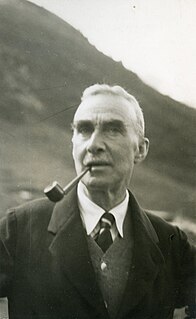
Cyril Bradley Rootham was an English composer, educator and organist. His work at Cambridge University made him an influential figure in English music life. A Fellow of St John's College, where he was also organist, Rootham ran the Cambridge University Musical Society, whose innovative concert programming helped form English musical tastes of the time. One of his students was the younger composer Arthur Bliss, who valued his tuition in orchestration. Rootham's own compositions include two symphonies and several smaller orchestral pieces, an opera, chamber music, and many choral settings. Among his solo songs are some settings of verses by Siegfried Sassoon which were made in co-operation with the poet.
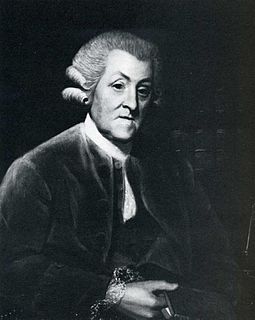
Sir John Hawkins was an English author and friend of Dr Samuel Johnson and Horace Walpole. He was part of Johnson's various clubs but later left The Literary Club after a disagreement with some of Johnson's other friends. His friendship with Johnson continued and he was made one of the executors of Johnson's will.
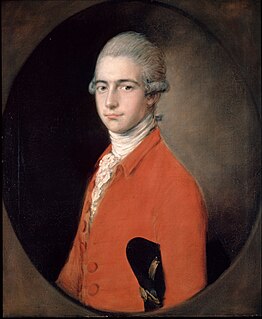
Thomas (Tom) Linley the younger was the eldest son of the composer Thomas Linley the elder and his wife Mary Johnson. He was one of the most precocious composers and performers that have been known in England, and became known as the "English Mozart".

Charles James Kennedy Osborne Scott was an English organist and choral conductor who played an important part in developing the performance of choral and polyphonic music in England, especially of early and modern English music.
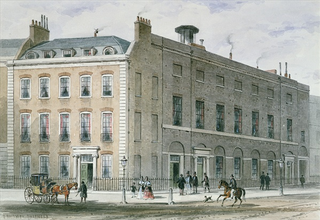
The Hanover Square Rooms or the Queen's Concert Rooms were assembly rooms established, principally for musical performances, on the corner of Hanover Square, London, by Sir John Gallini in partnership with Johann Christian Bach and Carl Friedrich Abel in 1774. For exactly one century this was the principal concert venue in London. The premises were demolished in 1900.
Ellis Gibbons was an English composer of the late Renaissance who associated with the English Madrigal School. Born in Cambridge to a musical family, Gibbons was the second surviving son of William Gibbons, a town wait. By 1598 he was known to be living in Cambridge's High ward, and later the Market ward. He owned property in Cambridge and London and probably spent much time there, presumably as a musician of some kind. At the age of 28 he became one of only two composers to contribute two pieces to The Triumphs of Oriana, a collection of 25 madrigals published in 1601. These madrigals were Long live faire Oriana and Round about her Charret – although some have doubted his authorship; none of his other works survive. Two months after his mother's death, his career was cut short by his early death in May 1603, leaving behind his brothers Edward, Ferdinando and Orlando, who would become the most famous musician of the family. Orlando's son, Christopher, was also a noted composer.
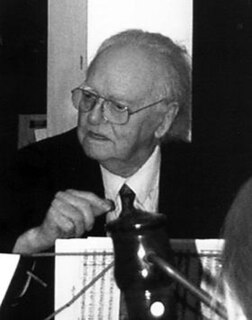
Edgar Hubert Hunt was a British musician and musicologist. He was a key figure in the early music revival in Britain in general, and in the revival of the recorder in particular. He was a founding member of the Society of Recorder Players, of which he was musical director for more than fifty years, and of the Galpin Society, of which he was later president. He was head of the early music department at Trinity College of Music, which was the first conservatory in the world to introduce a diploma in recorder.
Frank Mercer, (1891–1955), was the editor of the 1935 reprint of Charles Burney's A General History of Music (1776–1789), 2 volumes, published by G. T. Foulis. The American edition was published by Harcourt Brace in 1935. This edition was reprinted in 1957 by Dover Publications, of New York.
The Musical Antiquarian Society was a British society established in 1840. It published, during seven years, 19 volumes of choral music from the 16th and 17th centuries.
William Spark was an English musician, writer, composer and organist based in Leeds.
References
- 1 2 Reginald Nettel (January 1948). The Oldest Surviving English Musical Club: Some Historical Notes on the Madrigal Society of London. The Musical Quarterly34 (1): 97–108. (subscription required).
- ↑ John Hawkins (1776). A General History of the Science and Practice of Music, five volumes. London: T. Payne.
- ↑ Charles Mackeson (1900). Madrigal Society. In: George Grove (editor) (1900). A Dictionary of Music and Musicians, volume II. London: Macmillan.
- ↑ J. G. Craufurd (1955–1956). The Madrigal Society. Proceedings of the Royal Musical Association, 82nd Session (1955–1956): 33–46. (subscription required).